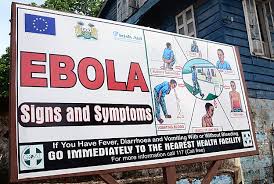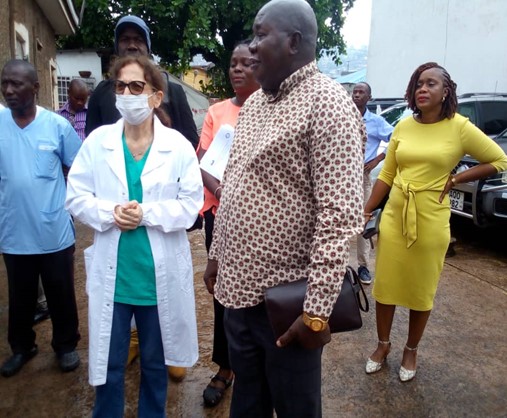Sharing the blame for slow response to Ebola outbreak in West Africa
If we go by the historical background of Ebola Virus Disease (EVD), one would expect more efforts to cure the disease from Africa. EVD has been with the continent since 1976 when Peter Piot, a Belgian scientist, first discovered the virus, but Western and Asian scientists are leading the race for cure.
About forty years ago, close to twenty years following the advent of Independence in Africa, Ebola broke out in Yambuku, Democratic Republic of Congo (DRC) then Zaire. In the present unprecedented outbreak in West Africa, infection rate has transcended traditional rural communities to urban centres and capital cities. Notwithstanding, there has been no continental marshal plan for a cure. This is not without the fact that Congolese doctors, amidst fierce critic from their European counterparts, had discovered a blood serum treatment from survivors when they battled with Ebola during the Kikwit outbreak.
Doctors in Sierra Leone hope to weather the storm against multinational conglomerates over global funds presided over by W.H.O. to advance blood serum treatment. And according to one biochemist involved with the arrangements, multinationals may have the upper hand. It is not certain whether Sierra Leonean doctors have been disadvantaged by highly connected multinationals to W.H.O. or because of inadequacy to conduct the study.
Meanwhile, it is predicted that EVD will kill over a million and half people more if not contained. In hindsight, a plan to isolate West Africans with little or no pressure from global forces should have been foreseen.
Despite the luxury of time since 1976 when the disease first broke out and the knowledge of the havoc Ebola could cause without a cure, all that has come out of Africa so far is an empty cliché that “Africa will rise up again”. A condescending position by some scholars that African researchers are lazy is yet to be challenged even by the most astute pan-Africanists. And by the look of things that glimmer of hope if any at all for Africans to engage in research to cure Ebola is grim.
But in times of challenges that demand serious thinking and gallantry, aid workers are shown, live on mainstream TVs, disembarking from land, air and sea vessels, almost with a sense of arrogant Immortal-deity confidence to help and often so not without crowds of disillusioned natives to welcome them.
In the same way, the arrival of Belgians in Zaire to rescue crying Africans for help from the deadly Ebola virus during the Kikwit outbreak was documented. Rescue missions to save Africans from such natural scourges and sometimes self-afflicted calamities ranging from mutinies, ethnic war to civil conflicts are pretty much not uncommon.
Since self-rule, colonialism has been blamed for everything not done correctly especially in the realm of scientific innovations. The reason for this may not be unconnected to the fact that politics and philosophy are very much attractive to peoples on the continent who are hell-bent on self-rule. No doubt that ingrained in the psyche of people in Sierra Leone and may be amongst many other Africans, is a belief system in ‘mammy water’ myth, influenced by Thetis, a half fish and half mortal sea nymph, mother of Achilles of Greek mythology.
But each time a calamity strikes, not much attention is paid to studying its causes and effects. Waiting for another one and another help to come may be the practice on the continent but not so fast in Sierra Leone. After its civil war, Sierra Leone has produced one of the best known examples of a post-war reconciliation scheme, which was however also not without the help of the guardian angels and the absence of scientific innovations.
The absence of good governance system in the past had been identified and accepted by the people of Sierra Leone as the scourge of their development and the cause of the 11-year old civil conflict in that West African nation. And efforts were well-underway to turn things around; its people were busy doing their bits in developing a torn nation by civil war, delivering social democracy to a poverty stricken population, ushering good governance, conducting elections and ministering smooth and peaceful change of governments, and here comes Ebola – the brand new scourge.
But as usual, the lackadaisical attitude to scientific research by a people more busy rolling out peace and conflict study students from universities, Sierra Leone was caught pants down by this new scourge. And like in Zaire, they lined up at Lungi International airport with a glimmer of hope that more delegations of guardian angels will land.
In all of this though, President Ernest Bai Koroma stands out like a sore thumb because of the much respect he has garnered amongst his peers over the years as president of Sierra Leone. Compounded by the UN resolution that Ebola, like ISIS, is a global security threat, he is not doing badly in using that to his advantage in mobilizing a coalition of countries to aid him in the fight against Ebola.
Also apparent in this crisis is the existing tilted geopolitical spheres of influence between Africa and the West. While President Obama is way ahead in mobilizing countries around the war on ISIS, a lesser and more expensive global security threat than Ebola, the presidents of Guinea, Liberia and Sierra Leone are experiencing what they have called a “slow response” from the global community in fighting Ebola.
Sad to note that as the hue and cry from West Africa that Ebola has hit the world is setting in, there is still no greater effort from the world in fighting back. Instead, some parochial contributions to ban West Africans from travelling abroad or to simply apply the “cordon sanitaire” from powerful opinion leaders from around the world are gaining ground.
By Karamoh Kabba
Stay with Sierra Express Media, for your trusted place in news!
© 2014, https:. All rights reserved.






